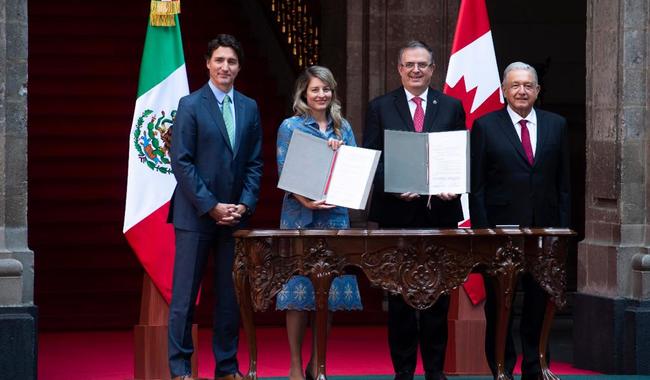Mexico City, January 11, 2023.- At the close of the bilateral meeting held during the North American Leaders' Summit, President Andrés Manuel López Obrador of Mexico and Prime Minister Justin Trudeau of Canada were witnesses of honor at the signing of the Memorandum of Understanding between the National Institute of Indigenous Peoples (INPI) and Crown-Indigenous Relations and Northern Affairs Canada (Cirnac).
The agreement was formally renewed by Foreign Secretary Marcelo Ebrard and the Minister of Foreign Affairs of Canada, Mélanie Joly.
Canada and Mexico share a common identity as nations with a rich indigenous heritage, and both are on the path of reconciliation with their indigenous peoples. Both countries recognize that the inclusion and participation of indigenous communities are essential for long-term sustainable development, and for promoting self-sufficiency, prosperityand well-being in the region.
Renewal of the Memorandum of Understanding reaffirms the commitment of the governments of Mexico and Canada to strengthen cooperation in indigenous affairs in order to achieve true inclusive development, which improves the income and quality of life of the indigenous communities without endangering their cultural identity.
Under the principle established by President López Obrador, "For the good of all, the poor come first, the humblest and forgotten, especially the indigenous peoples," the Government of Mexico is moving forward in a new relationship with indigenous peoples and communities and Afro-Mexicans, by placing them at the heart of its public policies.
This relationship is based on recognition, respect and the effective exercise of their fundamental rights as subjects of public law, and on the exercise of their autonomy, self-determination, forms of organization, the protection of their lands, territories, natural resources and ancestral culture.
INPI Director General Adelfo Regino Montes, present at the signing, said that the aim is for both institutions to strengthen respect for and promotion of the political, social, economic, spiritual and environmental rights of indigenous peoples.
He said it was important for Mexico and Canada to define, regulate, design, execute, coordinate, promote monitoring and evaluate the existing legal frameworks to ensure that indigenous peoples can exercise their rights.
Bilateral agreement on indigenous affairs
Both nations agreed to exchange information on their indigenous peoples to help develop policies, programs, projects and strategies that seek to ensure the exercise and implementation of their rights, while safeguarding their personal information, in accordance with the laws of each country.
Considering that Mexico and Canada share a close, lasting and mutually beneficial relationship, with the renewal of the Memorandum of Understanding they recognize the integral and unique role of indigenous peoples and their contributions to the diversity and richness of their cultures and languages.
The two countries affirm the need to respect and promote the inherent rights of indigenous peoples recognized in the United Nations Declaration on the Rights of Indigenous Peoples adopted by the United Nations General Assembly on September 13, 2007.
By signing this Memorandum, Mexico and Canada wish to strengthen their cooperation on matters related to the rights of indigenous peoples and to improve their quality of life in the two countries by designing a mechanism that facilitates the exchange of good practices, information, experiences and knowledge.
The document acknowledges that indigenous peoples have diverse ways of life, languages and political, economic and cultural structures. Therefore, it will strengthen respect for and the promotion of the rights of Mexican and Canadian indigenous peoples.
--
